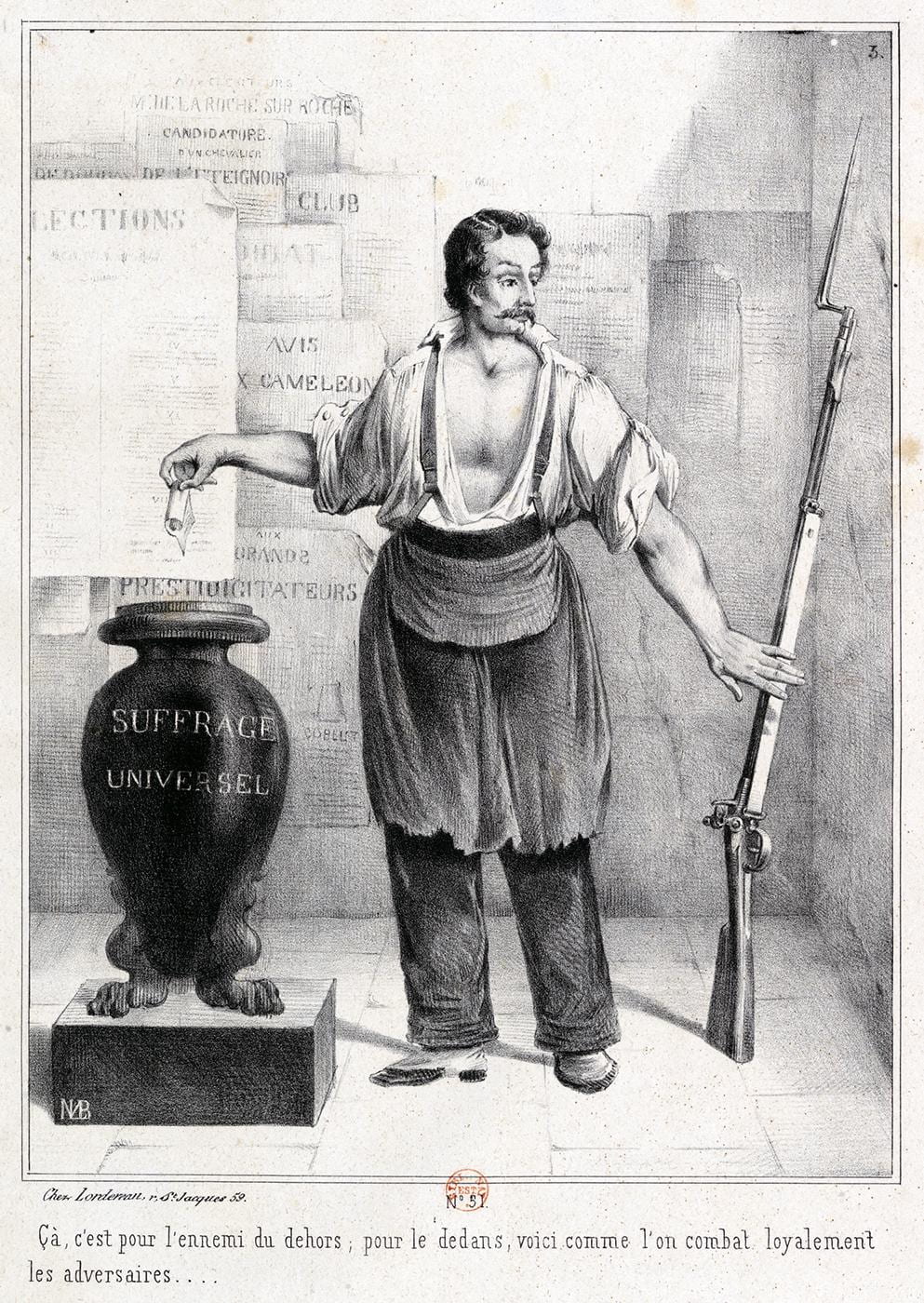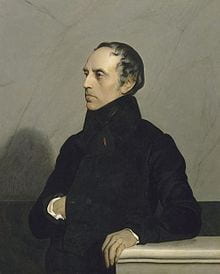by guest contributor Gianna Englert

M.L. Bosredon, “L’urne et le fusil” (April 1848). A worker sets aside his weapon to engage in the act of voting—a faith that universal suffrage would mitigate violence. This was a claim that liberals rejected.
2017 has done a lot for the history of ideas. “Post-truth” politics, tyranny, nationalism, and the nature of executive power have pushed us to make sense of the present by appealing to the past. The history of political thought offers solid ground, a way to steady ourselves—not to venerate what has come before, but to use it to clarify or challenge our own ideas.
Debates surrounding citizenship also lend themselves to this approach. They return us to foundational political questions. They force us to ask who is in, who is out, and why.
These questions are not new, nor are they distinctly American. We can learn about them from a seemingly unlikely time and place: from liberal theorists in nineteenth-century France, who were similarly concerned to find solid ground. As Jeremy Jennings notes in his Revolution and the Republic, “the Revolution, and the Republic it produced, gave birth to a prolonged and immensely sophisticated debate about what it meant to be a member of a political community…. It was a debate about the very fundamentals of politics” (25). Democrats used the language of rights, primarily the right to vote. Liberals defended capacité (capacity) as that which preceded political rights. Capacity conferred the title to political participation—it defined who was and who was not a participant in the franchise. There was much at stake in this definition. Only a capable citizenry could overcome revolutionary passion by reason, and safeguard the freedoms and institutions that would ensure a stable nation.
The discourse of capacity drew criticism from liberalism’s nineteenth-century opponents and later scholars. French liberals have been criticized for espousing exclusionary politics that tied citizenship to wealth and social class. Yet this interpretation misrepresents their theory of citizenship. Capacity was actually an elastic, potentially expansive standard for political inclusion. The liberal definition of the citizen was similarly flexible, designed to evolve alongside changing social and economic conditions.

François Guizot (1787-1874)
The discourse of capacité originated with François Guizot (1787-1874), whose politics and personality have long been associated with the revolution of 1848. But his historical lectures, delivered from 1820-22 and again in 1828, offer an alternative to his image as unpopular, uncompromising politician. Prior his role in the July Monarchy, he was known for his narrative history of European institutions—praised by theorists in France, Germany, and even by John Stuart Mill in England. His method of “philosophical history” linked politics to society through the study of the past. Political institutions had to fit the given “social state,” a term that encompassed both economic and class structure. “Before becoming a cause,” Guizot wrote, “political institutions are an effect; society produces them before being modified by them” (Essays on the History of France, 83). Philosophical history was most valuable for how it informed French politics. From the perspective it provided, Guizot saw that neither aristocratic nor democratic rule was well suited to post-revolutionary French society. He championed the alternative of a representative government with capable rather than universal suffrage.
What did it mean to be capable? Guizot associated capacity with individual rationality, independence, and economic participation. Most importantly, the capable citizen could recognize and promote “the social interest,” a standard apart from the individual and the family. The citizen, a participant in the franchise, was first and foremost a member of the community, capable of recognizing what the public good demanded. Guizot named commercial participation among the signs of capacity, as it revealed one’s engagement—indeed, one’s membership—in society.
Those signs of capacity were also variable. Just as political institutions depended upon historically variable social conditions, so too did the requirements of citizenship change over time. Given capacity’s historical character, it was simply wrong to define the capable electorate as a permanently exclusive class. Capacity should remain ever open to “legal suspicion,” since:
The determination of the conditions of capacity and that of the external characteristics which reveal it, possess, by the very nature of things, no universal or permanent character. And not only is it unnecessary to endeavor to fix them, but the laws should oppose any unchangeable prescription regarding them. (History of the Origins of Representative Government in Europe, 337)
But Guizot’s own political career was at odds with his theory. If we limit our study to his writings and speeches under the July Monarchy, the image of a dogmatic, inflexible thinker inevitably surfaces. In 1847, he condemned universal suffrage before the Chamber as a destructive force, “whose day would never come” (Speech of 26 March, Histoire Parliamentaire V, 383). Absent from Guizot’s later thought is any mention of the fluidity of capacity or of the potentially more inclusive electorate that might follow.
Guizot’s politics show the path liberalism took on the question of citizenship. Liberals tried to impede the progress of mass politics, and to restrict the franchise to a small, permanent class of the capable. Unsurprisingly, they failed. In an effort to avoid the rule of the multitude, liberals proposed increasingly stringent residency and property requirements for suffrage, which at once disenfranchised and frustrated much of the population. In a democratizing society, liberals vainly stood astride history. But they also failed to live according to their own standards. They tried to preserve as static that which was intended, as Guizot first argued, to be elastic: the concept of capacity and the idea of the citizen. When liberals sacrificed their theoretical foundations to defend political power, they lost the battle for both.
Despite liberalism’s political limits, we should not dismiss the promise of its theory. In his historical discussion of capacity, Guizot separated citizenship from social class. Capacity was not an exclusive, permanent possession for certain persons or classes, but an evolving, potentially progressive standard for inclusion. If capacity was tied to history, extension of the franchise was possible and in some cases, necessary.
Can liberalism’s past help us make sense of the present? The tradition’s complicated history, marked by tension between theory and practice, offers both a rich vision of citizenship and a cautionary tale of political exclusion. Guizotian capacity would preclude exclusions based explicitly on ascriptive characteristics like race, ethnicity, and gender. But as Guizot’s practical politics revealed, “capacity” could also be co-opted to justify these kind of exclusions, or to import fixed standards for citizenship under the guise of so-called progressive appeals to rationality or independence. This is the darker side of any standard for inclusion, and we should be worried about the potential abuses associated with such standards. The political positions of nineteenth century liberals remind us of these darker possibilities, which persist under different forms even in present-day liberal democracies.
Still, capacity has advantages for thinking about liberal citizenship more broadly. Though French liberals most often addressed the right to vote, they also explored what made someone an informal member of the community, with ties to a given place, way of life, and common cause. And they urged that these informal elements of social membership distinguished the individual from the citizen, arguing that the law ought to track social realities rather than resist them—that citizenship was not just suffrage, but a set of practices and relationships that the law ought to recognize. This resonates with our contemporary experience. There are entire groups of people who are undoubtedly members of American communities without being citizens, who participate in society without benefit of the full complement of civil and political rights. Guizot’s thought shows that we need not invoke thick, idealized conceptions of participation to inform liberal democratic practice or its standards for inclusion. For all of its difficulties, the liberal discourse of capacity prompts us to reconsider what it means to be a member of a political community—a question that has not lost any urgency.
Gianna Englert is a Postdoctoral Research Associate at the Political Theory Project at Brown University. She holds a Ph.D. in Government from Georgetown University. Her current book manuscript, Industry and Inclusion: Citizenship in the French Liberal Tradition, explores the economic dimensions of citizenship and political membership in nineteenth-century French liberalism.



March 29, 2017 at 11:02 am
Reblogged this on O LADO ESCURO DA LUA.
March 29, 2017 at 11:14 am
Very insightful! Nice read.